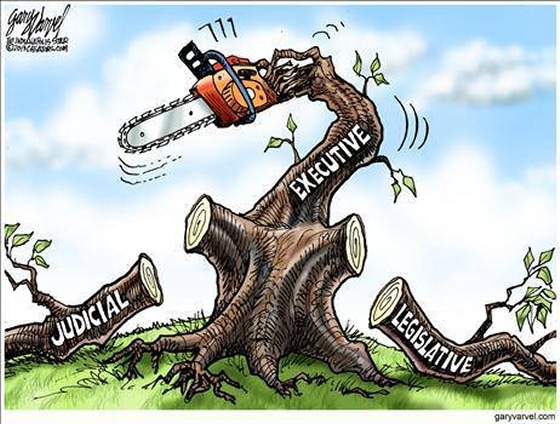Despite United States Congress members insisting that Congress debate and vote on US military actions overseas, congressional leadership has chosen inaction, allowing military actions unilaterally pursued by the executive branch to continue unrestrained. And, when, this year, consideration has begun to move forward on an authorization for use of military force (AUMF), it is in the form of legislation (S.J.Res. 59) sponsored by Senate Foreign Relations Committee Chairman Bob Corker (R-TN) that would rubber-stamp the US government’s existing wars and sweepingly authorize the executive branch to choose to pursue much more additional military action across the world.
How did we reach this situation so far removed from the US Constitution’s dictate that Congress alone decides if the US goes to war, as well as what is the scope of any such wars? Constitutional scholar Louis Fisher examines this question in detail in his article “Unconstitutional Wars from Truman Forward” in the latest issue of the Center for the Study of Statesmanship’s journal Humanitas.
In his article, Fisher, who is a member of the Ron Paul Institute Academic Board, lays out the clear direction in the Constitution that it is Congress alone that has the power to place the US into war as well as to define the limits of any war it authorizes. Fisher supports this argument with a discussion of both the wording of the Constitution and context including statements of Founding Fathers.
The legislature’s power over war, Fisher notes, was recognized in the judiciary in the early years of the US. As an example, Fisher discusses an 1804 US Supreme Court decision requiring the payment of damages for a US naval captain seizing a Danish ship that was sailing from a French port. President John Adams, in ordering the seizing of ships sailing to or from French ports in the Quasi-War, had ordered actions beyond the scope of congressional authorization that only said ships could be seized that were sailing to French ports.
Then, in 1936, the US Supreme Court decision in the case United States v. Curtis-Wright Export Corporation included dicta (comments made in a decision though not part of the decision’s holding or the reasoning used to reach the holding) supporting expansive presidential power to unilaterally pursue war. While Fisher, in his article, shows in detail the faults with the dicta, he also notes that the argument presented in the dicta has “expanded presidential power from one decade to the next.”
Another avenue supporting expanded presidential powers in regard to war, which Fisher explores in detail, is presidents pointing to international organizations, whether the United Nations (UN) of the North Atlantic Treaty Organization (NATO), to improperly attempt to justify military actions without congressional authorization. Similarly, Fisher critiques arguments rooted in the War Powers Resolution and the 2001 AUMF related to the September 11, 2001 attacks in America and the 2002 AUMF regarding Iraq for excusing the executive branch unilaterally pursuing military actions around the world.
Read Fisher’s article here.


